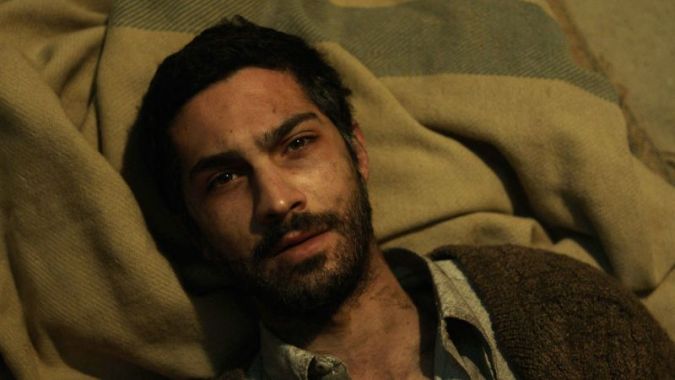It’s 1973. Uruguay is on the cusp of a brutal military coup that will go on to last twelve years. It will ban political parties, unions, any and all forms of resistance, in the name of protecting its people from the Marxist guerilla group known as the Tupamaros. Prior to José Mujica’s final arrest, the former guerrilla was nearly shot to death in 1970, and fled prison not once, but twice before finally landing in jail for the duration of authoritarian rule in the country. It’s here, at what is perhaps the longest yard of Mujica’s life, that La noche de 12 años (A Twelve Year Night), the latest from Montividean director Álvaro Brechner, takes place. The film is a humanist chronicle of resilience, madness, and cruelty now available on Netflix for your streaming pleasure.
To say Mujica survives the ordeal is hardly a spoiler, considering the now retired statesman served as President of Uruguay from 2010 to 2015. La noche de 12 años, Uruguay’s official entry for the Best Foreign Language Film category of the Oscars, mostly resists the sort of suffering hero fetishization that characterizes films of its ilk, aiming instead for a small-scale appreciation of the footholds that keep individuals afloat under extreme duress.
In an interview with AFP, Brechner explained his disinterest in making an overtly political film, opting instead for “an exploration of the human condition. The idea of men who find themselves thrust into abandon, solitude, to the precipice of madness, and how one is able to come back from that and reinvent oneself.”
While the title betrays the film’s interest in endurance – bodily pain or abstinence, as in Steve McQueen’s Hunger, is sidestepped for a more existentialist approach, succinctly captured in an opening epigraph by Franz Kafka about torture. From these fading words we’re taken immediately to a vertiginous shot that has the camera swirling around a fixed point from within a gritty prison space, grounding the film in the subjective experience of our three protagonists – Mujica, of course, but also his friends, the now famed poet and writer Mauricio Rosencof (Chino Darín) and the late Eleuterio “Nato” Huidobro (Alfonso Tort), a politician and former Minister of Defense during Mujica’s tenure.

The film shows the three as they’re shuffled from a traditional prison to remote containment cells where they’re treated more like hostages than prisoners. The success of the junta at this juncture sees the military government acting out in ways that a constitutional society would in theory deem unacceptable – the men are taken off the map to the desperation of their mothers and wives, and (most infamously) Mujica is confined to the pit of an old horse watering trough for more than two years in isolation.
“It was less important for me to describe how those years were than (…) get as close as possible to the experiential,” Brechner explained in an interview with Variety, “The problem is when our senses start to fail and you don’t have the horizon as a reference. The brain starts to unravel.”
The film shows the mental universe of people who were robbed of everything that makes them human.
Hand-in-hand with the men’s deteriorating appearance – blackened, chunks of teeth, frail, bony frames, and matted hair – La noche de 12 años makes occasional stylistic shifts into horror as the men grapple with the menace of hallucinations and psychosis. It’s not the guards or vengeful military leaders that pose the greatest threat, but the potential for the body and mind – so mangled and abused in these inhuman parameters – to elude the person inside. Flashbacks to moments in the three men’s personal lives and the brutal events leading up to their capture contextualize the historical circumstances and the sort of emotional toll that being ripped out of a life and thrust into primitive anonymity has on the individual. It’s brutal stuff, and Brechner never reigns in the emotional dramatization so much as he avoids adding unrealistic flourishes of hope, and offers instead moments of dark humor and inklings of relief. While still pointedly bleak, these instances function like crumbs to feed the soul – Chino and Alfonso invent a code of knocks to communicate through the wall between their cells, a radio cast of a soccer match is loud enough for them to hear one particular evening, a shit-stained sheet of newspaper provides some much welcome reading material.
It’s a delicate balance, providing levity without being misleading as to the conditions of suffering and barbarism in play. La noche de 12 años knows the miracle is built-in to the facts of its story – that three men could simply survive twelve years with a pinky hanging onto a sliver of life – and aims to, as Brechner puts it “show the mental universe of people who were robbed of everything that makes them human.” How it distinguishes this sort of extraordinary resilience from other human survival narratives is in its characterization of this strength as simply the refusal to be anything but.
La noche de 12 años (A Twelve Year Night) is currently streaming on Netflix.




